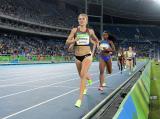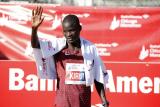Folders |
Kirui Used Tactics Rather Than Pace in Chicago - Emma KumerPublished by
Marathons without pacesetters favor new kind of champion By Emma Kumer, DyeStat Contributor Abel Kirui, winner of last fall's Chicago Marathon and 2012 Olympic marathon silver medalist, isn’t just fast. He’s consistently unpredictable. This year, his 2-hour, 11-minute, 23-second finish in the Chicago Marathon was the slowest winning time since 1993. Kirui went into the race practically jogging, hitting the 5-kilometer mark at a 2:16 pace and the half-marathon for a 2:13 pace. When Kirui crossed the line sprinting like his days back in the 2012 London Games, it was clear that his second half was one of the fastest Chicago had ever seen. He still won the race, but the pace had been a risky roller coaster. After examining his split times, it appears Kirui didn’t have a plan. According to him, that is the plan. “The fluctuation of the pace favors me a lot because it allows me to store energy for the sprint finish,” Kirui said. “I was prepared in the running tactics, so my body was ready for any pace, whether high speed or moderate.” Wouldn’t it be easier to just run the marathon at a steady pace? It would be, but the Chicago Marathon doesn’t want to be easy. That’s part of the reason they removed pacesetters for elite runners from the race in 2014. Ever since, times stopped favoring the fast and started stimulating the strategic. Prior to 2014, the Chicago Marathon was a different race. There were runners known as “race rabbits” hired to run at a pre-determined pace before dropping out at mile 20, the point where most marathoners consider the most competitive segment of the 26.2-mile race begins. According to Cindy Kuzma, a certified running coach and contributing editor to various health and fitness journals including Runner’s World magazine, the rabbits meant that elite competitors don’t have to “race and think at the same time.” “If you have a pacesetter, you don’t really have to deal with the psychological factors as much. All you have to do is try to keep up,” Kuzma says. “If you’re physiologically able to, you will. And if you aren’t, you won’t. It takes that sort of thinking and strategizing out of it.” That’s exactly what the Chicago Marathon liked about racing. To them, it wasn’t about just running the miles, it was also about running the numbers. So, as if running 26.2 miles at a five-minute-mile pace wasn’t hard enough, Chicago decided to follow in the footsteps of other American major marathons, New York and Boston, and eliminate the rabbits. Results have been immediate, as winning times in the Chicago Marathon have become slower the past two years, from 2:04 to 2:11 for men and 2:19 to 2:23 for women. But average race times have stayed fairly consistent around 4:33 for the past four years. In other words, the race itself isn’t getting slower, just the leaders. It’s simply harder to go fast when there’s no one there to tell you how fast to go. “A lot of major marathons don’t have pacesetters. Now, instead of a record time, they’re just looking for a great race,” said Jeff Jonaitis, former Chicago Marathon pacesetter and cross country coach at Carl Sandburg High School in Orland Park, Ill. “I think it’s more exciting this way, seeing a real race from the gun to the finish. You really get a sense of how competitively smart these runners are, rather than just how fast they can run.” The result is a race where, to win, you don’t just have to be quick, you have to be strategic. Thus, you end up with champions like Kirui. He starts marathons at breakneck speed and then slows down for the second half, before sprinting at the end. When there is no one to pace the marathon, Kirui is in the perfect position do what he does best. The outcome is an unpredictable race that is difficult for even him, but impossible for almost everyone else. |







